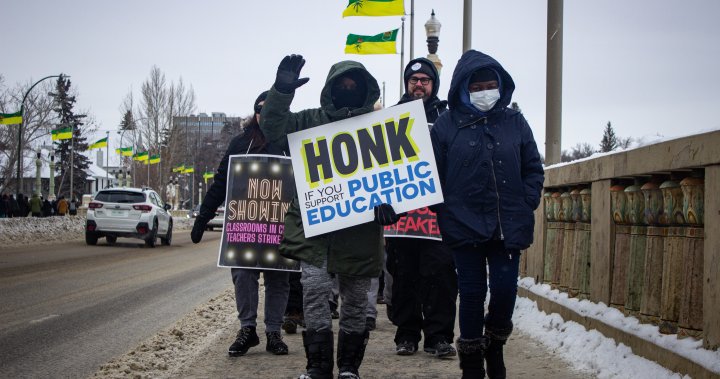The Saskatchewan Teachers’ Federation (STF) and the ministry of education were initially hopeful about returning to the bargaining table, but tensions have escalated, with the STF feeling less optimistic and fearing a standstill in negotiations. Education Minister Jeremy Cockrill announced an MOU with the support of the Saskatchewan School Boards Association, aiming to create an accountability framework for the multi-year funding agreement. However, STF president Samantha Becotte expressed disappointment, stating that the government’s offer was a take-it-or-leave-it proposition, lacking willingness to engage in dialogue.
Despite efforts to reach a resolution, the STF and the government appear to be at a standstill, with disagreements over the binding nature of the accountability framework within the contract. The government has invited the STF back to the bargaining table, but remains firm in its stance that class size and complexity will not be included in the new collective agreement. The government has offered the STF the opportunity to participate in the development of the accountability framework MOU, allowing teachers to have input on the utilization of the allocated funds for classroom supports.
Andrew Stevens, an associate professor at the University of Regina, suggests that the government could explore other options, such as bringing in an arbitrator or passing legislation to close negotiations. On the STF side, increased job action and the possibility of a full strike remain potential courses of action. Stevens notes that the government has historically been reluctant to engage in binding arbitration, and speculates about their strategy in the current bargaining process.
The concerns raised by the STF regarding the MOU and the funding model resonate with Stevens, who highlights the lack of strings attached to the agreement, allowing the government to change its approach in the future. The STF’s apprehensions about the MOU’s non-binding nature are justified, as it could potentially undermine the progress made in negotiations. The uncertainty surrounding the MOU and the funding model adds complexity to the ongoing dispute between the STF and the government.
In light of the ongoing negotiations and the potential for further escalation, both parties must carefully consider their next steps. The STF’s concerns about accountability and the binding nature of the agreement are valid, given the historical context of government actions in similar situations. As discussions continue, it remains to be seen how the STF and the government will navigate the complexities of the bargaining process and seek a mutually acceptable resolution. Only time will tell whether the parties can find common ground and reach a satisfactory outcome in the contract negotiations.















